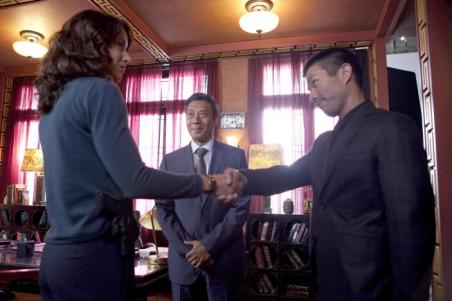I imagine the pitch for this show was something to the effect of “Imagine ‘Fight Club’ but Tyler Durden is a dog with a British accent.” That statement was immediately followed by awkward, protracted silence, immediately followed by the creators buying the studio execs drinks until they decided that was a great idea for a show. Given the nature of the previews (dating back months, it feels like) for Wilfred, “Happiness” felt awfully heavy-handed and pseudo-philosophical. Granted, the TV spots long ago revealed that the show would begin with Ryan (Elijah Wood) unsuccessfully attempting suicide. What those ads did not prepare us for is the strangely serious nature of the relationship between Ryan and Wilfred, the hot neighbor’s dog who may or may not be a figment of Ryan’s imagination (indeed, tonight seemed to offer a few hints that Wilfred may simply be an extension of Ryan’s own demented psyche, a possibility that could be left open to the very end, a la the infinitely superior relationship between Calvin and his—apparently—stuffed tiger, Hobbes). Wilfred’s half-interested attempts to shake Ryan from his morbid goal are laden with silly life-metaphors and empty rhetoric about embracing the selfish, simple lifestyle of a dog, while simultaneously muddling the metaphor by making Wilfred un-doglike in almost every sense of the word (assuming “doglike” is a word). The long and the short of it is that after one episode, none of it makes any sense. That’s not an ideal thing to say after a “pilot” episode—so-called because it’s supposed to pilot the viewer through the concept of the show and serve as a guide to appreciate everything that comes after.
Consider “Happiness” in that light. What do we know about the concept after this half hour? Wilfred may or may not be the neighbor’s dog or just a complete figment of Ryan’s imagination (he seems to have a crush on the neighbor—he could be hallucinating the encounters with her as well), which is fine because it lends the show a secondary source of tension that I presume will run beneath every episode’s A-story. Less fine is the fact that Wilfred is not particularly likable or funny. We also gain a few snippets of Ryan’s past that, at least from where I’m standing, mostly make me feel like Wilfred should have shit in his boots instead of the biker’s. He’s a complete twit to his sister, whose worst offenses against him seem to be finding him a productive job that doesn’t involve practicing law (which, poor baby, his daddy made him do) and prescribing him sugar pills in order to “help” him with his neuroses without endangering his life or her own job. She ends up endangering the latter anyway when she goes out on a limb for him again with the head doctor. His condescending and dismissive response to her is the episode’s biggest misfire, which is a problem considering it’s supposed to be the emotional victory which sets Wilfred and Ryan off on their future adventures.
Given that Wilfred betrays Ryan by episode’s end and doesn’t really seem to have any genuine interest in his well-being, I recognize that the moment with his sister may not be intended as a moment of victory. Within the episode’s structure, however, it’s hard to read it otherwise. Wilfred disrupts his downward spiral, provides hope of an “in” with a girl who might redeem his humanity a bit, offers him some clichéd advice about life, and then talks him into alienating his sister in a moment of “liberation”. If he’s the devil on Ryan’s shoulder then this show is going to be a lot to stomach—a man dressed as a dog making a suicidal man’s life more miserable is a tough route to take even for black humor—and if, as it seemed at a few points tonight, he’s going to play both angel and demon to Ryan, then the show seems to be taking an impossible route.
Wilfred isn’t nearly funny enough to justify him playing the role of troublemaker/pot-stirrer in Ryan’s life. It was pretty amazing, in fact, to see the end of the episode burn through a few more obvious anthropomorphized dog jokes, since they seem to be at least a part of Wilfred’s bread-and-butter. His accent and stoner habits certainly aren’t going to carry the day by themselves, which leaves very little for the show to go on if a guy in a dog suit is to be the central comedic conceit. Wilfred’s own hard-luck story doesn’t really pack much of a punch, so he’s neither funny nor sympathetic by the end of tonight’s episode. Using anecdotes about eating a dead possum’s insides via it’s anus isn’t winning over too many viewers either; the fact that somebody (or more troublingly, everybody) found that bit funny enough to make the final draft doesn’t bode too well for what’s to come later.
Even more troubling is the fact that Wood seems to be struggling mightily to make all of this work. He has plenty heaped on his plate—his character is driven by poor and unclear motivations, his hopelessness is ungrounded in any real sense of desperation, he’s intimidated by a talking dog for no particularly convincing reason, and he gets very little to do in the way of comedy, which is a shame given his natural talents and ability to invest himself into a character.
So I guess the show’s driving force moving forward surrounds a clarification of Wilfred’s role in Ryan’s life—will he solidify himself as an antagonist (openly or in sheep’s clothing) or will he have a change of heart and prove to be something of a wet-nosed fairy dogfather for Ryan? Of more potential interest, will the show continue to slather on the ambiguity regarding the nature of Wilfred? There’s something to be said for the question of whether Ryan will accept the reality of Wilfred as something real and frightening (as he clearly does this week) or whether he’ll begin to read him as some sort of extension of himself, which Wilfred suggests a couple of times tonight (the first time he adds “just kidding, I read your suicide note,” but that doesn’t seem entirely relevant to the implications he puts in play). However, if the less interesting questions are answered with unfortunate results (Wilfred is the conniving, unfunny creature he seems to be, for example), then I doubt this show will be around long enough to answer the more interesting ones.
Overall Score: 5.4/10
Great Lines, Interesting Moments, Whatnot and Occasionally What-Have-You:
“So long girl next door; hope they find my body before the smell becomes a problem for you.”
The first image of a clearly-inconvenienced Wilfred on the sidewalk behind Jenna at Ryan’s door is quite funny—a man in a dog suit with his hands on his hips in exasperation is apparently naturally funny.
What’s not funny: Ryan’s sister’s gross jokes about delivering babies.
“Got any DVDs? I like Matt Damon.”
Best exchange of the night:
“that’s from dune, how do you know that?”
“How do you know that?”
“We’re gonna need a bigger bong.”

























